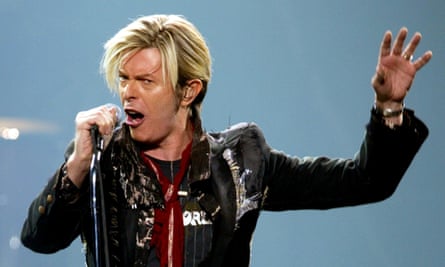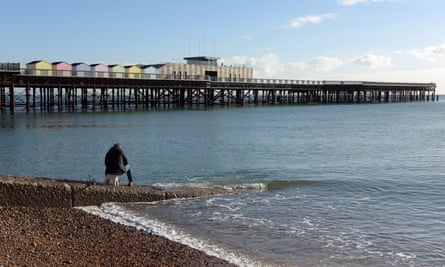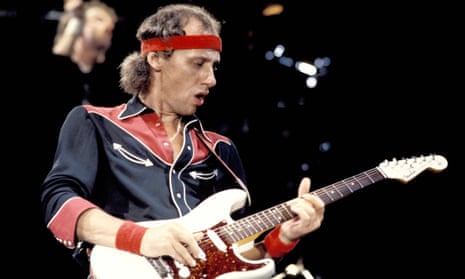First it was David Bowie selling his own “Bowie bonds”, and now fans of Dire Straits are being given the chance to invest in the band’s multimillion-selling back catalogue.
A new investment scheme has been launched that allows individuals, hedge funds and others to buy a share of the royalties that are paid out every time one of the British rock band’s songs or albums is bought, downloaded, streamed or played on the radio.
The venture, from Royalty Exchange, a US-based company specialising in buying and selling royalties, confirms what Bowie and others realised some time ago: classic songs are not only the soundtrack to people’s lives – they are also a potentially lucrative “asset class” that can be packaged up and sold off to wealthy investors – however much that idea might horrify fans.
The portfolio includes the band’s biggest hit Money for Nothing, which famously addressed the topic of rock stars earning millions of pounds by seemingly doing little more than playing the guitar or bashing a drum kit.
However, only those with deep pockets need apply. To be eligible for the scheme, investors must have more than $1m (£760,000) of investable assets aside from their main home or an annual income of $200,000-plus, or a joint income of $300,000-plus.

Dire Straits’ heyday was the 1980s and the band split in 1995 but, according to Royalty Exchange, their back catalogue’s earnings “are not only still growing but are outperforming the growth of the broader music industry”. Much of that growth is down to the boom in music streaming, which has introduced heritage rock acts to new generations and prompted many older music fans to revisit the bands of their youth.
The company said the portion of the Dire Straits back catalogue available for sale earned $296,000 (£225,000) in the past 12 months but had earned royalties since 1978, and added that while the music industry grew 14% from 2015 to 2017, “the Dire Straits catalogue earnings grew 60% in that same timeframe”.
The investment offer has come about because Dire Straits’ longtime former manager Ed Bicknell is selling off his share of the sound recording royalties generated by the band’s entire back catalogue, together with solo releases from the band members Mark Knopfler and John Illsley. That includes all six studio albums, including Brothers in Arms, the eighth best-selling album of all time in the UK, plus hits such as Sultans of Swing and Walk of Life, along with music videos, live albums and any existing or future best-of compilations.
Royalty Exchange said music royalties were “undervalued” and that the older “classic rock” bands were of particular interest to investors. It said it expected the Dire Straits catalogue to produce a cash yield of 8% in the first year and added that it was forecasting a 12-15% annualised rate of return over 10 years. Asked about the potential hazards, a spokesman said: “All investments have risk.”
Knopfler, the band’s lead singer and guitarist, is not involved in the investment scheme, although “he is aware of it”, the company said.
Some may wonder about the potential returns that might be generated by Dire Straits royalties, bearing in mind that for some people they are a band inextricably linked to the 80s and the yuppie generation, and that, unlike many of their peers, they are no longer in existence. The ChartMasters website noted earlier this year that while Brothers in Arms was the highest-selling rock album during the 1980s, “it is losing ground, since Bon Jovi’s Slippery When Wet, U2’s The Joshua Tree, Bruce Springsteen’s Born In the USA and Guns N’Roses’ Appetite for Destruction are now all ahead of it, with total sales ranging from 46m to 50m”.
Meanwhile, Money for Nothing – a US number one in 1985 – has in recent years run into censorship issues over its controversial lyrics, which could potentially limit airplay. Lines in the song include “See the little faggot with the earring and the makeup … That little faggot got his own jet airplane”, “Money for nothin’ and chicks for free” and “Bangin’ on the bongos like a chimpanzee”. In a 1985 interview with Rolling Stone magazine, Knopfler was quoted as saying: “The singer in Money for Nothing is a real ignoramus, hard hat mentality – somebody who sees everything in financial terms. I mean, this guy has a grudging respect for rock stars. He sees it in terms of, well, that’s not working and yet the guy’s rich: that’s a good scam.”
Investors from outside the US are able to participate in the new scheme, which is technically a “private syndicate”. Investors participate by buying units in a specially created limited liability company (LLC) that holds the royalties. Unit holders are then entitled to their proportional share of income generated by the LLC.
It remains to be seen whether Dire Straits fans will gain more access to the investments than Bowie fans did. In 1997, David Bowie raised $55m by creating so-called “Bowie bonds”, through which investors would receive a share of the royalties from 287 of his songs over the next 10 years. However, the bonds – which paid a 7.9% rate of interest – were all snapped up by the Prudential Insurance Company.
From chocolate to tennis: other investment schemes
Hotel Chocolat launched “chocolate bonds” in 2010, where customers who invested £2,000 received six boxes of chocolates each year rather than the cash interest. The chocolate boxes were priced at £18.95, so the “payout” was equal to 5.6% interest a year.

A community share scheme raised £600,000 from 3,000 investors to help restore Hastings Pier after a disastrous fire in 2010. However, despite winning the Stirling prize in 2013, the pier went into administration in 2017 and was sold to a private buyer, Sheikh Abid Gulzar, making the community shares worthless.
